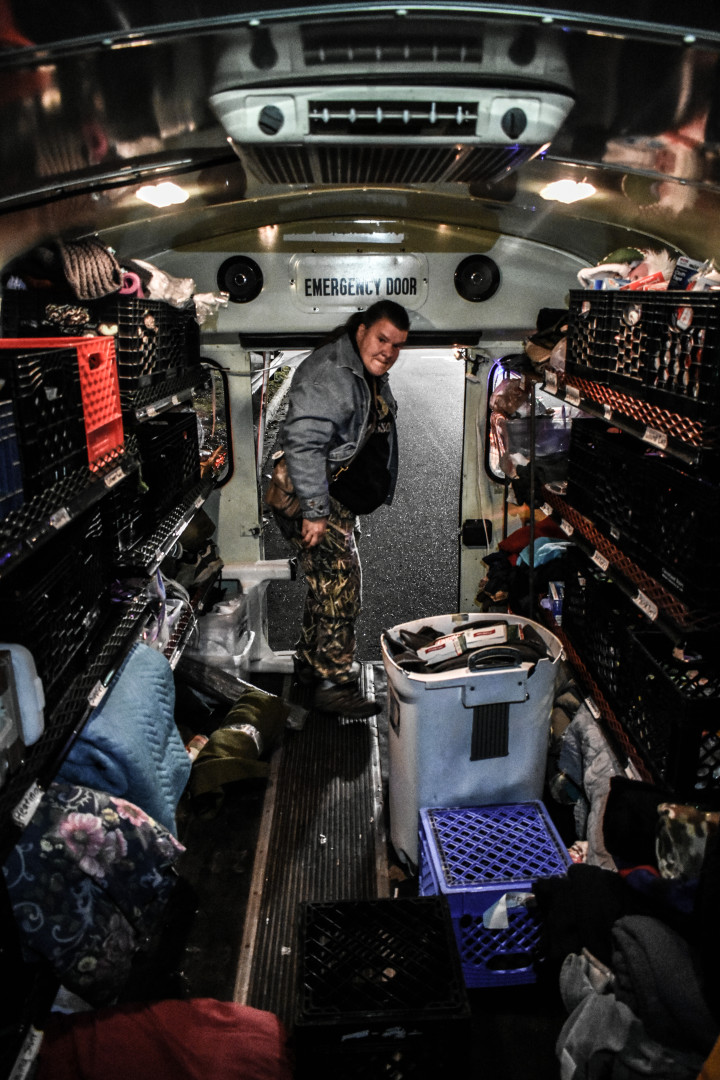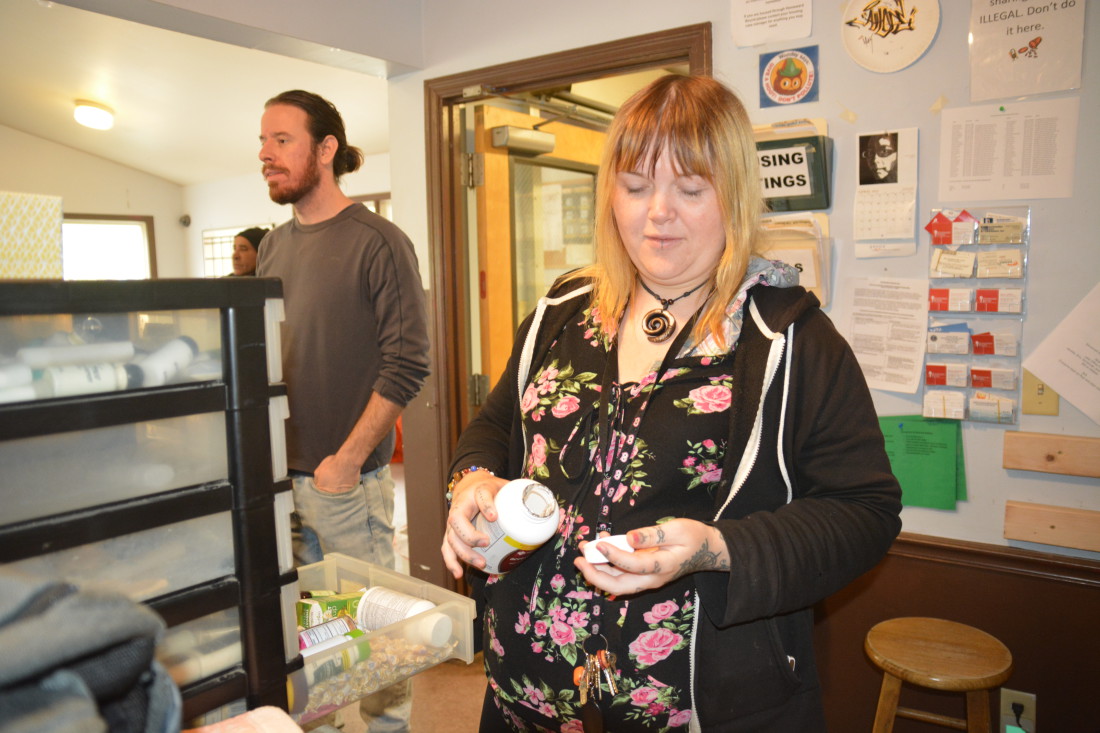The October 2016 death of Janett Marie Jones has had repercussions that she probably never would have imagined.
Jones, who was homeless, died of hypothermia at the age of 53 in her sleeping bag just across the river from the New Belgium brewing plant.
“I remember seeing a report on CNN that said homelessness is one of the most lethal conditions,” says the Rev. Amy Cantrell of BeLoved Asheville, an intentional community that serves marginalized people.
Cantrell says that about 20 homeless people die prematurely in and around Asheville each year.
People who are homeless often have no access to the most basic first aid, let alone full medical services, Cantrell explains. Most must either walk or use city buses for transportation, and without a calendar, a reliable timepiece and bus fare, it can be difficult to get to a doctor’s appointment. As a result, she continues, a small cut or insect bite can lead to a life-threatening infection. And since many people on the street fear authority, she notes, it becomes important to help homeless people trust that helpers won’t report the location of their camps or arrest them for trespassing.
BeLoved is one of several local nonprofits that have made it their mission to reach out to the homeless to help them gain access to medical care and other resources.
Part of the solution
As members of BeLoved’s Homeless Voices group discussed what might have prevented Jones’ death, the idea of a team of medics serving people experiencing homelessness was born.
“We sat with that for a while and wondered what we could do,” Cantrell says. “It occurred to us that we could be the solution.”
The idea of teaching volunteers basic first aid and distributing bandages, antibiotic cream and over-the-counter medications took shape, and the BeLoved street medics program was born. BeLoved brings in trainers for the street medics, although some of them are already trained in CPR. The program currently has about a dozen medics who can address various medical issues, including heat exhaustion, cuts, poison ivy, insect bites and hypothermia.
Although homeless people can go to the emergency room with injuries and illnesses, they then go back to the streets, usually with little or no follow-up care. Because they have little access to clean water or a warm, clean place to sleep, they often wind up with complications from things as simple as insect bites, common colds and poison ivy.
Cantrell recalls one man who had a gash in his leg. He’d had stitches but he was released without antibiotic cream or clean bandages.
“I remember the bandages were filthy and falling off,” Cantrell says. “We dressed the wound with clean bandages and then had him come back every couple of days until the wound healed.”
Others who work with homeless people see similar problems.
Willa Van Camp, who works as an intern at 12 Baskets Café in West Asheville, says homeless people frequently come in and ask for a Band-Aid when what they really need is medical attention for a raging infection. The café rescues food leftovers from restaurants, caterers and grocery stores and serves it free of charge at lunchtime every weekday.
Enough abundance
The Rev. Shannon Spencer, founder of the Asheville Poverty Initiative, which operates 12 Baskets, says that contrary to the politics of scarcity, there are enough resources for everyone to have basic needs met.
“We have to stop thinking about the bottom line being about money and profit,” Spencer says. “That’s a false narrative.”
Although there are resources for people who are released following a hospital stay, such as the medical respite care facility at Haywood Street Congregation, no such resources exist for those who have been to the emergency room or a free clinic.
The BeLoved street medic program takes up that slack. It uses a van to store and transport supplies needed by people living on the streets, including antibiotic cream and bandages, anti-itch creams and more.

James Gambrell of Asheville, formerly homeless, has taken the training and now knows how to properly warm near-frozen limbs, perform CPR, treat insect bites and poison ivy and otherwise treat minor ailments that could become major issues without the proper attention.
“I had always been told that if you put baking powder in a cut that’s bleeding, it’ll stop the bleeding,” he says. “Now I know that can cause infection. It used to be that with CPR, you’d do so many compressions and then breathe. Now they say to just do the compressions.”
Also included in the training is information on plants with healing properties and how to make nonalcoholic tinctures and salves, he adds.
For example, Gambrell says he learned that a mixture of powdered cayenne pepper and water can help increase blood flow to the extremities, which someone with hypothermia needs to warm fingers and toes more quickly.
“Did you know you can get a lot of what you need right in the woods?” Gambrell says. “You don’t need expensive drugs for everything.”
Help where it’s needed
At the front desk of Homeward Bound’s day center, AHOPE, Myriam Rehberg, the center’s program manager, hands out ibuprofen and other over-the-counter medications.
“We see a lot here, and if we see something serious, we call EMS,” Rehberg says.
Most things can be dealt with using over-the-counter medicines and the first aid kit, but it’s all done in the center, she notes.
“We do a lot here, but the street medics actually go out and look for people,” she says. “They go to camps and help people where they are.”
Adrienne Sigmon, a member of the BeLoved community, says the van goes out every other week, visiting camps and other places homeless people congregate.
“We’ll park in an area, and teams will go out and bring people back,” she says. “This gives us access to them, to the creation of community.”
The van also carries a supply of hats, scarves, gloves and socks to distribute.
Sigmon says BeLoved accepts donations. What’s needed most is triple antibiotic cream, anti-itch cream and over-the-counter medications. BeLoved also accepts donations of goods or money to help stock the van. Money can be donated via the website (avl.mx/4wt), and other donations can be dropped off at the BeLoved House at 39 Grove St. in downtown Asheville.
“We have a nurse case manager here who takes people down to the Dale Fell clinic, which sees people without an appointment,” says Nicole Brown, director of homeless services at Homeward Bound. “That works well as an adjunct to the Minnie Jones clinic, which sees people by appointment.” The Dale Fell Health Center is located at 7 McDowell St. in Asheville; the Minnie Jones Health Center, operated by Western North Carolina Community Health Services, is at 257 Biltmore Ave.
Of course, some health problems can’t be dealt with using first aid, Brown says.
“Poor nutrition is a big part of the problem,” Brown explains. “A person who’s homeless will walk an average of 8 miles a day, usually with a heavy backpack, but they still gain weight because their diets consist mostly of carbs and sugar.”
Places like 12 Baskets, the Haywood Street Congregation’s Wednesday lunch program and the BeLoved House provide nutritious food, but so far there are no programs that deliver nutritious food to people who are homeless.
But at least, says Gambrell, the street medics are helping to improve the health of people on the streets.
“It’s part of living in community, which is different than grabbing what you can,” he says. “I like the idea of being able to help people who need it. I have the chance to help people avoid amputation, to help save lives, even to help people find the medicines they need among the plants in the woods.”
MORE INFO
BeLoved House, 39 Grove St., Asheville
Asheville Poverty Initiative/12 Baskets Café, 610 Haywood Road (entrance in the back of the building beneath Firestorm Books)
ashevillepovertyinitiative.org
Homeward Bound/AHOPE Day Center, 19 S. Ann St., Asheville




Amy and the rest of these good folks do great work! A tribute to the goodness that can respond in relevant ways to make people’s lives better.